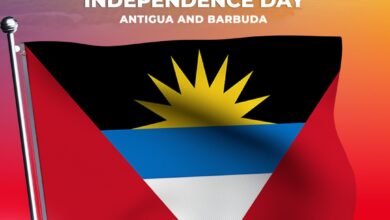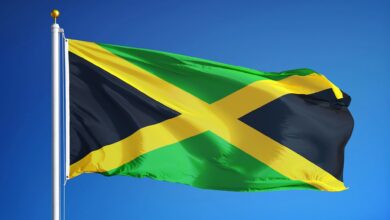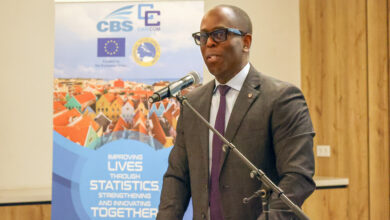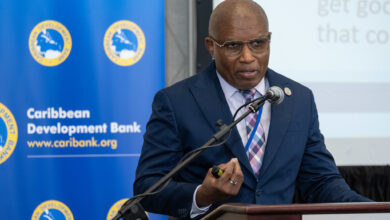The Twenty-First Meeting of the Council for Human and Social Development (COHSOD) on Health was convened under the theme: Promoting Equity in Human Development through Public Health, at the Guyana International Conference Centre, Liliendaal, Turkeyen, Greater Georgetown, on 15 -16 April, 2011. The meeting was chaired by Dr. the Honourable Leslie Ramsammy, Minister of Health of Guyana.
In attendance were: the Hon Donville O. Innis, Minister of Health Barbados; Senator the Hon. Ann Peters, Minister of Health, Grenada; the Hon. Colin Riley, Minister of Health, Montserrat and their delegations.
Also in attendance were: Chief Medical Officers and representatives from regional institutions and organisations including Caribbean Accreditation Authority for Education in Medicine and Other Health Professions (CAAM-HP), Caribbean Epidemiology Center (CAREC/ PAHO/ WHO), Caribbean Environment Health Institute (CEHI), Caribbean Health research Council (CHRC), Caribbean Regional Drug Testing Laboratory (CRDTL), International Food and Beverage Alliance (IFBA), Pan American Health Organisation (PAHO), University of the West Indies and the Public Health Agency of Canada.
OPENING CEREMONY
At the opening ceremony, there were statements made by Dr. the Honourable Leslie Ramsammy, Chair of COHSOD and Minister of Health, Guyana; the Honourable Carolyn Rodrigues-Birkett, Minister of Foreign Affairs, Guyana; Her Excellency Lolita Applewhaite, Secretary-General of the Caribbean Community (ag); Dr Eva Lewis-Fuller, Chief Medical Officer, Jamaica and Ms Myrna Bernard, Officer in Charge of the Directorate of Human and Social Development, CARICOM Secretariat.
Minister Ramsammy highlighted several achievements made by the Caribbean Community in the regional health sector but noted some critical areas which needed improvement and called for greater investment in health development. He singled out Chronic Non-Communicable Diseases (NCDs) and especially tobacco control as one of the areas which needed improvements and challenged Member States who had not yet ratified the World Health Organisation (WHO) Framework Convention on Tobacco Control (FCTC) to do so immediately so that the Region could expedite the reinforcement of standards in tobacco advertising, labeling, promotion and sponsorship.
While acknowledging that all CARICOM countries were experiencing the economic crunch, he was adamant that each country had to take action to mitigate the increasing costs of health care and preserve the human rights basis of the Caribbean health care system.
Ambassador Lolita Applewhaite pointed to critical milestones that had been achieved by the Community over the past ten years, chief of which were the provisions of the Nassau Declaration 2001, which underscored that the Health of the Region is the Wealth of the Region; the establishment of PANCAP to mitigate the spread of HIV and AIDS; the priorities of the Caribbean Cooperation in Health and more recently, in-roads made in NCDs under the Port-of-Spain Declaration, Uniting to Stop Chronic Non-Communicable Diseases; and the current work towards the establishment of a centre of excellence in public health – the Caribbean Public Health Agency (CARPHA). Using those milestones, she illustrated how far the Region had come; what it had achieved in health sector reforms and pointed to those achievements as the foundation on which the Community could build as it moved forward.
Minister Rodrigues-Birkett challenged the COHSOD to find creative and effective measures to address the problem of NCDs, cautioning that the future of the CSME should not be compromised by lifestyle practices that prevented its peoples from living healthy lives.
Ms Bernard pointed to what she described as the ambitious and progressive step being taken by the Region in the establishment of a single Public Health Agency (CARPHA) from the five Regional Health Institutions, in order to address its public health needs in a more coordinated manner. She noted that the COHSOD would review steps towards the implementation of this Institution with a view to ensuring that mechanisms were put in place for its establishment this year; and this she deemed as a fitting way to mark the Tenth Anniversary of the Nassau Declaration.
Dr Lewis-Fuller endorsed the need for further investment in health and the importance of developing synergies to combat NCDS; and further challenged the COHSOD Meeting to continue to be a model forum that advanced regional integration.
CHRONIC NON-COMMUNICABLE DISEASES
The COHSOD Meeting commended the progress made by the Region, in implementing the 15 actionable points in the Port-of-Spain Declaration – Uniting to Stop Chronic Non-Communicable Diseases – adopted by Member States in 2007, but noted the challenges in some areas such as the implementation of actions geared towards tobacco control, the formation of National NCD Commissions and the development of National NCD prevention plans. In this regard, the COHSOD urged Member States to support the efforts of the Caribbean Regional Office on Standards and Quality (CROSQ) to complete the preparation of regional standards for tobacco control for the approval of the Council for Trade and Economic Development (COTED).
The Meeting also urged Member States to use the tools developed by the CARICOM Secretariat to fast-track the formation of NCD Commissions and requested that the CARICOM Secretariat give support to Member States in developing national NCD prevention plans, strengthening the regional communication plan for the Port-of-Spain Declaration and in particular, support the development of a robust plan for Caribbean Wellness Day.
Towards a Modern School Nutrition Policy
The COHSOD expressed appreciation to the Government of Barbados for its leadership in strengthening the Regional NCD Prevention Programme through the development of its School Nutrition Policy, which was presented to the Meeting. They noted that the guidelines could be used to assist other governments in the development of policies to improve the effectiveness of nutrition education efforts, directed at schools at the national level. The Meeting approved the recommendation to use the policy document along with others as the model framework for development of a Regional Policy Framework. They further requested that the CARICOM Secretariat and the Caribbean Food and Nutrition Institute (CFNI) convene the necessary regional consultations to develop this framework, and report to the Caucus of Ministers of Health in 2012.
UWI-IDB Surveillance Project
The COHSOD received a report on a surveillance project initiated by the University of the West Indies, St Augustine Campus. Titled Regional Non-Communicable Diseases Surveillance System, the project was designed to respond to the need for reliable, comprehensive data on NCDs and their risk factors. The Meeting agreed that such data would assist in the better planning, delivery and monitoring of programmes and protocols targeting chronic disease and health promotion and as such considered how this project could be harnessed to benefit the entire Region. In this context therefore, the COHSOD urged Member States already benefiting from the project information system to work towards its sustainability.
Promoting an Integrated Policy Approach to Reducing NCDs The COHSOD endorsed the need for an integrated policy approach to reducing the high incidence of NCDs in CARICOM countries, with emphasis on promoting physical activity through increased physical education and sports in schools and communities. This is in keeping with the actions of the Port-of-Spain Declaration and in particular the goals of Caribbean Wellness Day. The COHSOD agreed that coordinated interventions should also be pursued through the formal education system.
ESTABLISHMENT OF CARPHA
It was noted that progress towards the establishment of this centre of excellence in public health was affected by the challenges encountered with regard to the Inter-Governmental Agreement (IGA) to bring the entity legally into being. The COHSOD therefore endorsed the recommendations made by the CARPHA Steering Committee, paving the way for completion of the Agreement and urged Member States to sign the Inter-Governmental Agreement.
The Meeting also approved the plan of action for accelerating the resource mobilisation efforts and challenged Ministers and officials to follow-up with their Attorneys-General to facilitate the signing of the IGA in order to expedite resource mobilisation efforts.
Additionally, the Meeting applauded the active participation of CARICOM ambassadors and other high level officials in the level of preparations being made for the Partners Meeting scheduled for 13 June 2011 at PAHO, in Washington, D.C.
PANCAP UPDATE ON HIV AND AIDS
Improving Access of Caribbean Migrant Populations to HIV and AIDS Services
The COHSOD noted that PANCAP was implementing a project on improving access of migrant population to HIV series. This was a technical cooperation project funded by German Technical Cooperation (GIZ) to the tune of 2.5 Million Euros. The project was being piloted in Antigua and Barbuda, Guyana, St. Maarten, Suriname and Trinidad and Tobago and focused on developing policy guidelines in improving access to HIV services; strengthening the participation of migrant population in advocacy network; enhancing the number of public, private and non-governmental entities offering HIV services to migrants and identifying and piloting effective financing mechanism to secure access of migrants population to services. Noting the progress being made in the implementation of this project, The COHSOD commended PANCAP for its work and thanked the GIZ for its support to the project.
A Model Policy on Stigma and Discrimination Having noted the process in the development of a Draft Model Regional Policy on Reducing Stigma and Discrimination on HIV and AIDS, the COHSOD urged completion of the review at the National level and mandated that it be presented to the Caucus of Ministers in September for endorsement
REGIONAL INSURANCE MECHANISM
The Meeting reviewed a feasibility study for the introduction of a regional health insurance mechanism, intended to provide options for financing of health care in particular as it related to migrant populations. They commended the DAH International for its meticulous work; thanked the Caribbean Development Bank (CDB) and the Pan American Health Organisation (PAHO) for funding the study and referred the study to Ministers of Health for further discussion and action in Member States.
DRUG ABUSE MANAGEMENT
The Meeting noted the main issues raised on Drug Abuse Management which highlighted three aspects of the Region’s response to drug demand reduction: the implementation of the Regional Drug Demand Reduction Strategy; the introduction of Drug Treatment Courts as a more cost-effective alternative to incarceration of drug abuse offenders and capacity building for sustainable development through training and education which included integrating drug issues into the curricular offerings of Caribbean University programmes.
The COHSOD commended the CARICOM Secretariat for its role in strengthening National Drug Councils and providing them with appropriate tools to build capacities in reducing the demand for illicit drugs. In noting the capacity building and training interventions and their potential to address drug addiction across all sectors, the COHSOD gave its full support and urged national drug councils to support initiatives in the sharing of data, best practices and in participating in research and programme development.
REGIONAL PHARMACEUTICAL POLICY
The COHSOD approved for implementation, the Regional Pharmaceutical Policy that would give CARICOM countries easier access to quality medicines at affordable prices and assist in strengthening regulatory authorities in the Region. The Meeting agreed that the Pharmaceutical Policy would be an integral part of national pharmaceutical policies developed by Member States and should be integrated as much as possible in other policies related to public health.
UPDATE ON THE CHOLERA SITUATION IN HAITI
The COHSOD discussed measures to mitigate the spread of cholera in the Region and lessons to be learnt from the outbreak in the disaster-ravaged nation of Haiti. The CARICOM Secretariat in tandem with the Pan-American Health Organisation (PAHO) and other development partners had been working assiduously to update and bring in line the national disaster response mechanism to mitigate a potential outbreak in the Region.
In this regard, they had made significant gains in bringing under control, the outbreak in Haiti and in improving the Region’s preparedness against Cholera in spite of the obvious challenges related to the political and administrative climate in Haiti. The Meeting therefore applauded the CARICOM efforts to assist Haiti and congratulated PAHO for its leadership in strengthening the Region’s preparedness against Cholera.
The COHSOD also mandated the CARICOM Secretariat, The Caribbean Disaster Emergency Management Agency (CDEMA) and PAHO to use existing templates to develop a regional mechanism for mobilising resources in emergencies and to present a report to the Caucus of Health Ministers in 2011.
REGIONAL MODEL CURRICULUM FOR NURSING
The Meeting approved the Model Curriculum for a Bachelors Degree in Nursing to be used by all Member States. The CARICOM Secretariat was mandated to circulate the Curriculum to Member States.
REPORT FROM THE CARIBBEAN ACCREDITATION AUTHORITY FOR EDUCATION IN MEDICINE AND OTHER HEALTH PROFESSIONALS (CAAM-HP)
The CAAM-HP reported significant strides made in improving the quality of health professional education in the Region and its evaluation of a number of institutions including the University of Guyana, the Grenada based St. George’s University and Ross University. It had also provided guidance to new and emerging schools seeking accreditation and was now ready to accredit the Region’s degree granting nursing programmes. In light of this, the Meeting congratulated CAAM-HP’s on the fulfillment of its mandate in the short period since its establishment in 2004; recognised the international support for the work of CAAM-HP; and urged the Member States to use the resource available through CAAM-HP as a confidence building measure for the quality of Health Professional Education in the Caribbean.
THE UNITED NATIONS HIGH LEVEL MEETINGS
High Level Meeting on HIV and AIDS, June 2011
The Meeting noted that the Caribbean’s team to the High Level Meeting on HIV and AIDS set for June 2011 would be led by the Hon Denzil Douglas, Prime Minister of St Kitts and Nevis and the Lead Head of Government with responsibility for Health, Human Resource Development and HIV/AIDS in the CARICOM Quasi Cabinet. The team would seek reaffirmation on the commitments made in 2001 and explore new areas in which the work of the Region against HIV and AIDS could be advanced. The Meeting noted that there were Pan Caribbean consultations hosted by UNAIDS to formulate regional positions for the High Level Meeting and there were ongoing consultations with Member States and Civil society. The COHSOD gave its full support to preparations for the High Level Meeting and urged Member States to participate at the highest level.
High Level Meeting on Chronic Diseases Prevention
COHSOD noted and discussed the state of preparations for the United Nations High Level Meeting on Chronic Disease Prevention set for September in New York and commended Member States for the high level of representation at consultations and meetings leading up to the meeting in Mexico. The COHSOD also acknowledged the efforts of CARICOM Secretariat and Heads of Government in their advocacy leading up to the UN Resolution and also applauded CARICOM’s role in crafting the Draft Outcome Document. They further advocated for mental health to be included in the priorities for CARICOM and endorsed the advocacy and media plan for building momentum and creating awareness of the UN High Level Meeting. It was in this context also that the COHSOD urged Ministers of Health to involve their Government Information Services in the roll-out of the media and advocacy plan at all levels of society. They further urged Member States to embrace the efforts of NGOs and the Private Sector in support of the Meeting. Most importantly, the COHSOD agreed that greater effort should be made in ensuring high level representation at the UN Meeting and participation in all fora of the Meeting including a side event for the Community.
The International Food and Beverage Alliance (IFBA)
Having received a presentation from the International Food and Beverage Alliance, which suggested ways in which the Alliance could collaborate with CARICOM in preparation for the UN High Level Meeting on Chronic Diseases Prevention, the COHSOD Meeting was encouraged by the goals of that Alliance in promoting healthy lifestyles. However, the COHSOD reaffirmed its commitment to the goals of the Port-of-Spain Declaration on NCDS and maintained its reservations relating to the promotion of breast milk substitutes by Nestle, a company which is a part of the Alliance. Notwithstanding, the COHSOD urged CARICOM to pursue partnership with the IFBA in especially in the areas of boosting Caribbean Wellness Day; in organizing high level regional consultations and promoting regional goals as outlined in the Port-of-Spain Declaration.
PAHO’S SUB-REGIONAL COOPERATION FRAMEWORK
Renewed Look at a Regional Information System
In acknowledging the challenges involved in developing and implementing a regional health information system, the COHSOD agreed to the establishment of a steering committee to guide the development of a Health Information System for the Region.
APPRECIATION
Ministers of Government expressed their appreciation to the Government and people of Guyana for the excellent arrangements put in place for the conduct of the business of the Meeting, and the warm hospitality extended to Delegates. They also recorded their gratitude for the support and participation of the regional and international partners and the Secretary-General and staff of the CARICOM Secretariat for the arrangements and effort made to ensure the success of the Meeting.
Georgetown, Guyana
16 April 2011





